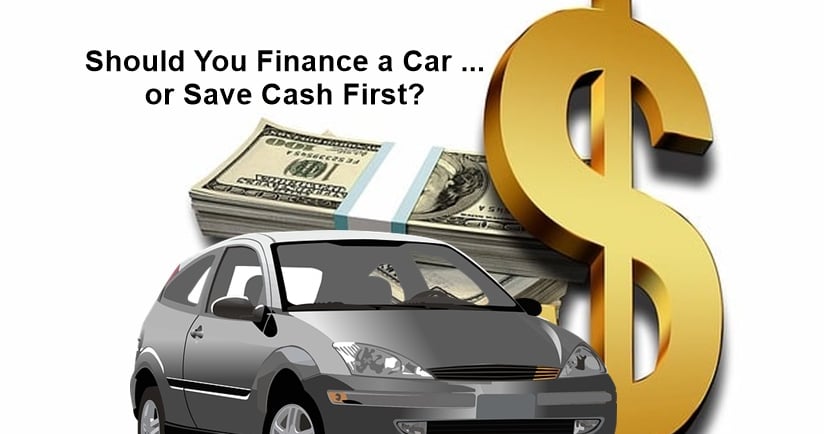Should You Finance a Car or Save Cash First? What to Know if Your Credit is Low
When you're facing the need for a new vehicle but wrestling with less-than-perfect credit, the decision between financing a car or saving up to pay cash becomes particularly difficult. This choice can significantly impact your financial future, and understanding the nuances is crucial for making the right decision for your specific situation.
GET CAR LOAN APPROVED
Fresh Start Consulting
7/22/20254 min read


Should You Finance a Car or Save Cash First? What to Know if Your Credit is Low
When you're facing the need for a new vehicle but wrestling with less-than-perfect credit, the decision between financing a car or saving up to pay cash becomes particularly difficult. This choice can significantly impact your financial future, and understanding the nuances is crucial for making the right decision for your specific situation.
The Case for Paying Cash
Paying cash for a vehicle offers several compelling advantages, especially when your credit score is working against you. The most obvious benefit is avoiding interest payments entirely. With poor credit, you might face interest rates ranging from 10% to 20% or even higher on an auto loan. On a $15,000 car financed over five years at 15% interest, you'd pay approximately $4,300 in interest alone – money that stays in your pocket when you pay cash.
Cash purchases also provide immediate ownership without monthly payment obligations. This freedom can be particularly valuable if your income is irregular or you're working to stabilize your financial situation. You won't need to carry comprehensive insurance coverage as required by lenders, potentially saving hundreds of dollars annually on insurance premiums.
Additionally, cash buyers often have stronger negotiating positions. Dealers appreciate the certainty of immediate payment and may be more willing to negotiate on price. You can also expand your search to include private sellers, who typically offer better deals than dealerships but often prefer cash transactions.
When Financing Makes Sense Despite Poor Credit
However, financing isn't automatically a bad choice, even with challenged credit. The key consideration is opportunity cost – what else could you do with that cash that might provide greater long-term benefit?
If you have high-interest debt, such as credit cards charging 18% to 25% annual interest, using available cash to eliminate this debt while financing a car at a lower rate makes mathematical sense. Even a subprime auto loan at 15% beats paying 22% on credit card balances.
Financing can also help rebuild your credit score when managed responsibly. Auto loans are installment loans, which credit scoring models view favorably when payments are made on time. A successfully managed car loan can gradually improve your credit profile, potentially qualifying you for better rates on future loans, including mortgages.
Emergency fund preservation presents another compelling reason to consider financing. Financial experts typically recommend maintaining three to six months of expenses in readily accessible savings. If purchasing a car with cash would deplete your emergency fund, financing might be the wiser choice, even at higher interest rates.
Strategies for Low-Credit Borrowers
If you decide financing is your best option, several strategies can help minimize the financial impact of poor credit.
FreshStartConsult.com offers expert advice to help you get approved for financing.
Start by obtaining your credit reports from all three major bureaus and disputing any errors you find. Even small improvements in your credit score can translate to better loan terms. Consider waiting a few months to improve your score if your current transportation situation allows.
Shop around extensively for the best rates. Don't limit yourself to traditional banks – credit unions often offer more competitive rates for members with challenged credit. Online lenders have also emerged as viable alternatives, sometimes providing better terms than traditional institutions.
Consider a co-signer if someone with good credit is willing to help. This can dramatically improve your loan terms, but remember that your co-signer becomes equally responsible for the debt. Make sure you can handle the payments reliably to protect their credit.
Choose a shorter loan term if possible. While longer terms reduce monthly payments, they result in significantly more interest paid over the life of the loan. A three-year loan at 15% interest costs much less than a six-year loan at the same rate.
The Middle Ground Approach
Sometimes the best strategy combines elements of both approaches. Consider purchasing a less expensive, reliable used car with cash while continuing to save for your ideal vehicle. This approach gets you mobile immediately while avoiding high-interest debt.
Alternatively, you might make a substantial down payment and finance the remainder. A larger down payment reduces the loan amount, resulting in lower monthly payments and less total interest paid. It also reduces the risk of being "underwater" on the loan if the vehicle depreciates quickly.
Timing Considerations
The timing of your purchase can significantly impact which option serves you better. If interest rates are particularly high or your credit score is at a temporary low due to recent financial difficulties, waiting might be beneficial. Credit scores can improve relatively quickly with consistent positive payment behavior.
However, if your current vehicle is costing significant money in repairs or leaving you stranded, the value of reliable transportation might outweigh the extra cost of financing. Calculate the total cost of keeping your current vehicle running versus the cost of financing a replacement.
Making Your Decision
Ultimately, the choice between financing and paying cash depends on your complete financial picture. Calculate the total cost of each option, including opportunity costs. If you can earn more than your loan's interest rate through investments or by paying down higher-interest debt, financing might make sense.
Consider your job security and income stability. If your employment situation is uncertain, the flexibility of having cash reserves might outweigh the interest savings of a cash purchase.
Don't forget to factor in the total cost of ownership beyond the purchase price. Newer financed vehicles might require full coverage insurance and could have higher registration fees, while older cash purchases might need more frequent repairs.
The decision between financing a car or saving cash first when your credit is challenged requires careful consideration of your entire financial situation. While paying cash eliminates interest costs and provides immediate ownership, financing can sometimes be the smarter choice when it preserves emergency funds, helps build credit, or frees up cash for higher-priority debt elimination. Take time to run the numbers, consider your personal circumstances, and choose the option that best supports your long-term financial health.
FreshStartConsult.com specializes in helping people get a car loan. They offer a free, no-obligation consultation.
CONTACT INFO
Address
Bringing People Hope
Email to find out how it works!
info@freshstartconsult.com
FRESH Start Consulting
100 Matawan Road
Matawan, NJ 07747
Suite 325 #1129
